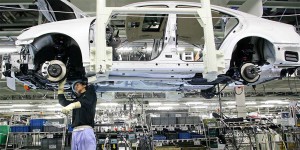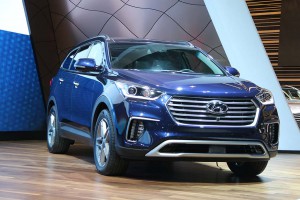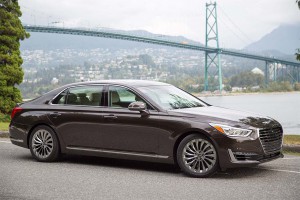Hyundai Motor Co. is facing a crippling, all-out strike for the first time in a dozen years, and the walkout at the maker’s Korean plants could soon impact its U.S. operations.
Korean labor unions have a history of militant action but had settled into an uneasy peace with Hyundai and rival automakers in recent years, at worst staging limited actions at select plants in order to win demands. The latest action follows a vote by workers last month that rejected Hyundai’s latest wage package.
While the world’s fifth-largest automaker – which also operates the Kia brand – has expanded its global production base in recent years, Hyundai still produces about 40% of its new cars and light trucks in South Korea, and many of those vehicles are earmarked for the U.S., as well as Europe, the Middle East and other parts of Asia.
The automaker issued a statement saying it was “obviously disappointed,” as operations across the home production network ground to a halt. Production was expected to partially resume after midnight Korean time, but the union said it would stage partial six-hour daily walkouts for the rest of the week.
Hyundai employees nearly 50,000 hourly workers in Korea. They were initially offered a wage package last month that offered more modest wage and benefit increases than in the previous agreement, triggering the “no” vote.
(Hyundai working up new, 250-mile EV. Click Here for more.)
The carmaker has long struggled to bring labor peace to its home factories. While this is the first all-out strike since 2004, there have been walkouts of some form in all but four years since the union was formed 29 years ago.
In fact, there were a series of partial strikes earlier this year that cost the carmaker lost production of about 100,000 vehicles worth an estimated $1.8 billion, according to Hyundai.
The confrontation comes at a bad time for both Hyundai and for South Korea. The company itself has been slipping after years of aggressive growth. Including Kia, global sales were forecast by industry analyst Cho Soo-hong, of NH Investment & Securities to slip 0.6%, to about 7.96 million, for all of 2016.
The automaker’s earnings fell during the April-June period, the tenth consecutive quarterly decline, and another dip is being forecast for the quarter closing later this week.
Hyundai has faced a number of setbacks, including weaker-than-expected performance in key markets such as the U.S. due to a lack of sport-utility vehicle models. It has also performed more poorly than expected in a number of emerging markets.
As a result, Korea has slipped behind India which has so far this year become the world’s fifth-largest auto producing nation. Hyundai has arguably contributed to the Korean decline by moving more production abroad. Both the Hyundai and Kia brands now operate assembly lines in the U.S., with new plants soon coming online in Mexico, as well.
“While we are obviously disappointed with any temporary stopped in production, we still continue to work with our labor union to resolve this issue as quickly as possible,” Hyundai said.
(First drive of the new Genesis G90. Click Here for the review.)
The South Korean trade ministry on Monday forecast the ongoing labor dispute could cut the carmaker’s exports by $1.3 billion if the partial walkouts continue through the end of the week. That compounds problems faced by the broader Korean economy – which has been hit by the embarrassing recall of the Samsung Galaxy Note 7 smartphone, and the bankruptcy of the Hanjin Shipping Company. Three of the country’s shipyards are also facing creditor-led debt restructuring.
The longer the strike continues the broader the potential impact, analysts cautioned. The walkout could hurt Hyundai Motor America in a variety of ways, particularly if it leads to shortages of some popular SUV models. But it could also disrupt the ongoing launch of the all-new Genesis luxury brand.
“To this time we have seen no impact on vehicle supplies in the United States,” said Hyundai Motor America’s lead spokesman Chris Hosford. But because of the lengthy shipping lines, any shortages likely wouldn’t be felt across the Pacific for a number of weeks.
(Click Here for a first drive of the new Kia Cadenza.)



